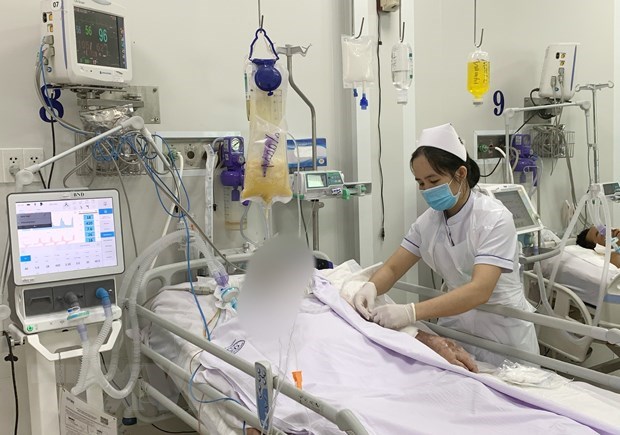Cho Ray Hospital medical staff actively care for patients with Botulinum poisoning.
In recent days, there have been consecutive cases of Botulinum poisoning in Ho Chi Minh City, causing many people to worry.
To date, 6 people have been hospitalized after eating pork roll and fermented fish sauce containing Botulinum toxin.
Medical experts warn that anyone is at risk of Botulinum poisoning because this is not a rare bacteria and people need to have knowledge to prevent and avoid the risk of poisoning from this bacteria.
Proposed storage mechanism of Botulinum antitoxin
On May 14 and 15, hospitals in Ho Chi Minh City continuously received 6 cases, including 3 adults and 3 children, who came to the emergency room with vomiting, abdominal pain, muscle paralysis, and difficulty swallowing. Test results showed that these people were poisoned with Botulinum toxin.
Dr. Le Quoc Hung, Head of the Department of Tropical Diseases, Cho Ray Hospital, said that Botulinum bacteria live in anaerobic environments, meaning that these bacteria can only survive in places with low oxygen concentrations.
In the normal environment, Botulinum cannot survive but it transforms into spores (bacteria create a shell for it to hibernate, at this time the bacteria is in an inactive state but still not dead) and it is present everywhere around humans.
These spores will become active again in an oxygen-free environment. Therefore, all canned and sealed foods are favorable environments for the growth of Botulinum spores. Thus, the possibility of human poisoning from consuming canned and sealed foods is still possible.
For example, in the US - where food safety standards are very high - 150-300 cases of botulinum poisoning are still recorded each year. In Vietnam, few cases were detected in the past because the ability to diagnose and understand this disease was very limited.
Since 2020, after the Minh Chay pate incident, doctors have known more about this bacteria. Along with that, paraclinical testing techniques have become more modern, so diagnosis has become easier and many cases of Botulinum poisoning have been detected in the community.
However, the worrying thing now is that Vietnam no longer has a specific antidote for BAT to treat people with Botulinum poisoning. Without an antidote, doctors can only treat with nutritional support and mechanical ventilation.
Dr. Le Quoc Hung acknowledged: “The lack of BAT is a very unfortunate problem for patients because if BAT is used early, within 48-72 hours, the patient can escape the state of paralysis and also not have to be put on a ventilator. Or if starting on a ventilator for 1-2 days, after about 5-7 days, the patient can recover and can get off the ventilator, do physical therapy to return to normal life. Without the drug, the patient's time on a ventilator will last from 3-6 months and face many dangerous complications. This is truly a challenge in the process of monitoring and treating patients with Botulinum poisoning."
According to Dr. Le Quoc Hung, BAT is a rare drug globally, priced at more than 8,000 USD/bottle. Currently, there is only one company in Canada that produces it in the world . Previously, Vietnam did not have an antidote for Botulinum, but in 2020, the Minh Chay pate poisoning incident left many people in critical condition, so the World Health Organization supported the drug for Vietnam.
By 2021, Cho Ray Hospital had imported 6 vials of BAT. This amount of medicine has been used up for people with botulinum poisoning after eating pickled carp in Quang Nam and two children who ate pork rolls sold on the street in Ho Chi Minh City.
Faced with this situation, the leadership of Cho Ray Hospital sent an urgent dispatch to the Ministry of Health requesting the purchase of BAT antidote. Previously, Dr. Nguyen Tri Thuc, Director of Cho Ray Hospital, had repeatedly proposed the establishment of a National Rare Medicine Storage Center managed by the Ministry of Health.
According to Dr. Thuc, rare drugs are drugs used for emergency treatment, treating rare cases such as Botulinum poisoning, venomous snake bites... that are rarely used but have quite high prices. Therefore, hospitals are often hesitant to buy these drugs because if there are no patients, the drugs will expire, which is a huge waste.
However, without medication, the patient will fall into a dangerous condition. Typical cases of Botulinum poisoning in recent times.
“While hospitals cannot stockpile rare drugs, the establishment of a National Rare Drug Storage Center is urgent. This center will be responsible for bidding, purchasing, storing and transferring rare drugs to medical facilities nationwide when necessary,” Dr. Nguyen Tri Thuc proposed.
Prevent the risk of Botulinum poisoning
To prevent the risk of Botulinum poisoning, Dr. Le Quoc Hung recommends that people who process bottled, jarred or sealed foods should clean the environment, wipe and clean the processing area regularly to avoid dirt, soil, sand and harmful bacteria from sticking to the food.
Food packaging should apply modern techniques. Manufacturers often irradiate sterilization rays when packaging to ensure food safety. People who package at home have a very high risk of food safety.
One measure that Dr. Hung believes people should apply when packaging food is to use a salt content of over 5% salt/100g of food because bacteria cannot grow in an environment that is too salty.
People should note not to use expired food, especially canned products that are swollen or deformed because these products have been attacked by Botulinum bacteria or other bacteria; or even if they are still within the expiration date and not deformed, but when opened, they no longer have their natural flavor, they should not be eaten.
A typical case is the case of two children with Botulinum poisoning in Thu Duc city who ate ham wrapped in nylon and started to show signs of watery, unusual taste. People can cook canned, sealed foods at high temperature for 10-15 minutes to help reduce the risk of Botulinum poisoning and other poisoning bacteria.
Doctor Truong Ngoc Phu, Children's Hospital 2, Ho Chi Minh City, advises parents to pay special attention to ensuring hygiene in the preparation of fresh food, and not to use honey for children under 1 year old. For canned food, it is necessary to choose the type with clear origin, safe packaging, and expiration date. When detecting food with strange color or smell, do not eat it and notify the seller, supplier or competent authorities. Absolutely do not consume suspicious and poor quality food to ensure the health and life of yourself and your family.
The Food Safety Department - Ministry of Health, warns people in production and processing to use ingredients that ensure food safety, strictly comply with hygiene requirements in the production process. In the production of canned food, strict sterilization regime must be followed.
People should only use food products and food ingredients with clear origin; absolutely do not use canned products that are expired, swollen, flattened, deformed, rusted, not intact or have unusual flavors or colors. At the same time, eat cooked food and drink boiled water; prioritize eating newly processed and cooked foods. Do not package food yourself and leave it for a long time in non-frozen conditions.
For fermented foods, packaged or covered in the traditional way (such as pickles, bamboo shoots, pickled eggplants...) it is necessary to ensure that they are sour and salty. When symptoms of Botulinum poisoning appear, you need to go to the nearest medical facility immediately for timely diagnosis and treatment./.
According to VNA
Source link


































































































Comment (0)